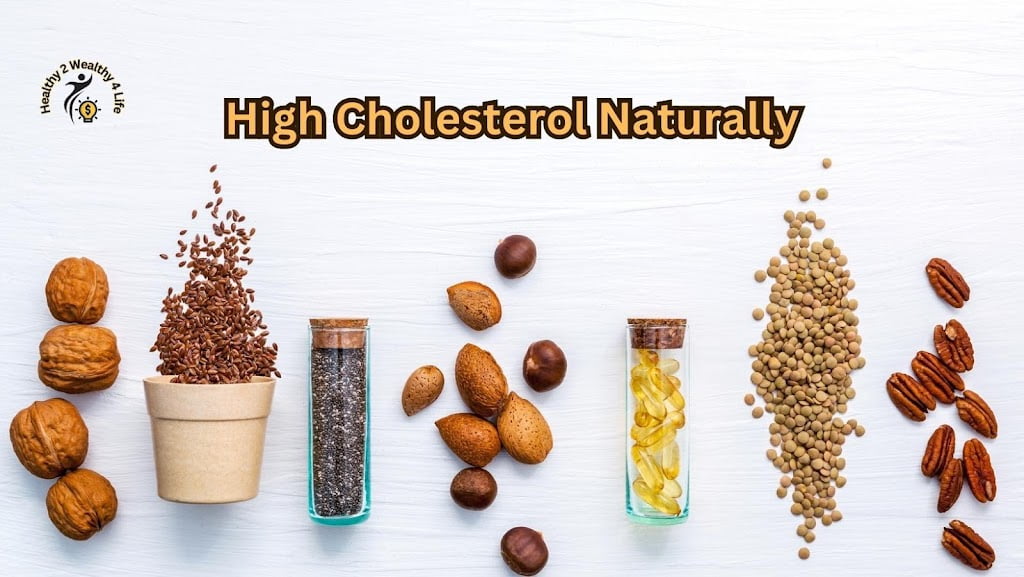Effective Strategies to Manage High Cholesterol Naturally
%20(4).jpg) |
| Effective Strategies to Manage High Cholesterol Naturally |
In our quest for better health, one common concern that often arises is high cholesterol levels. While there’s a wealth of information out there, it’s crucial to have a comprehensive guide that not only informs but empowers. We’ve compiled a detailed resource to help you effectively manage high cholesterol naturally, ensuring that you’re armed with the knowledge to take control of your health.
Understanding Cholesterol
Before diving into the strategies to manage high cholesterol, it’s essential to understand what cholesterol is and why it matters.
Cholesterol is a fatty substance found in your blood, and it comes in two types: LDL (low-density lipoprotein) and HDL (high-density lipoprotein).
While HDL is considered the “good” cholesterol that helps remove LDL from your bloodstream, high levels of LDL, often referred to as “bad” cholesterol, can increase your risk of heart disease and stroke.
Lifestyle Modifications
1. Balanced Diet
Maintaining a healthy diet is paramount when managing cholesterol. Consider incorporating these dietary changes:
-
Increase Fiber Intake: Foods rich in soluble fiber, such as oats, beans, and fruits, can help lower LDL cholesterol levels.
-
Healthy Fats: Opt for unsaturated fats found in avocados, nuts, and olive oil while reducing saturated and trans fats from red meat and processed foods.
-
Omega-3 Fatty Acids: Include fatty fish like salmon and mackerel, or consider fish oil supplements, to boost HDL levels.
2. Regular Exercise
Engaging in regular physical activity is another critical aspect of cholesterol management. Aim for at least 150 minutes of moderate-intensity exercise per week.
Incorporate aerobic exercises like walking, swimming, or cycling into your routine to increase HDL cholesterol and lower LDL cholesterol.
Home Remedies
1. Garlic
Garlic is a potent natural remedy for cholesterol management. Its active compound, allicin, has been shown to lower LDL levels and improve overall heart health.
Consider adding fresh garlic to your meals or taking garlic supplements.
2. Green Tea
Green tea contains antioxidants called catechins, which can help reduce LDL cholesterol levels. Aim for at least 2-3 cups of green tea daily to reap its benefits.
3. Plant Sterols
Plant sterols are naturally occurring compounds found in certain foods like nuts and seeds.
They can block the absorption of cholesterol in the digestive tract, effectively reducing LDL cholesterol levels. Consider incorporating foods rich in plant sterols into your diet.
Supplements
In addition to dietary changes and home remedies, some supplements can assist in managing cholesterol levels effectively:
1. Red Yeast Rice
Red yeast rice contains compounds that mimic statin medications, helping to lower LDL cholesterol.
However, consult your healthcare provider before using it, as it may interact with other medications.
2. Coenzyme Q10 (CoQ10)
CoQ10 is an antioxidant that may help counteract the muscle-related side effects of statin drugs while also supporting heart health.
Conclusion
Managing high cholesterol naturally requires a holistic approach that includes dietary changes, regular exercise, home remedies, and supplements.
By incorporating these strategies into your daily life, you can work towards achieving healthier cholesterol levels and reducing your risk of heart disease.
Remember to consult with a healthcare professional before making significant changes to your lifestyle or starting any new supplements to ensure they are suitable for your specific health needs.
Achieving optimal cholesterol levels is a crucial step towards a healthier, more vibrant life.
Implement these strategies, consult with a healthcare professional, and embark on your journey towards better cholesterol management. Your heart will thank you for it
FAQ’s
1. What is high cholesterol, and why is it a concern for my health?
High cholesterol refers to elevated levels of LDL (low-density lipoprotein) cholesterol in the blood, often referred to as “bad” cholesterol. This condition can increase your risk of heart disease and stroke, making it a significant health concern.
2. How can a balanced diet help manage high cholesterol naturally?
A balanced diet rich in soluble fiber, healthy fats, and omega-3 fatty acids can help lower LDL cholesterol levels. It’s essential to reduce saturated and trans fats from your diet and incorporate cholesterol-lowering foods.
3. What role does regular exercise play in cholesterol management?
Regular exercise, such as brisk walking, swimming, or cycling, can boost HDL (high-density lipoprotein) cholesterol while lowering LDL cholesterol. Aim for at least 150 minutes of moderate-intensity exercise per week.
4. Can garlic effectively lower cholesterol levels?
Yes, garlic contains allicin, which has been shown to lower LDL cholesterol levels and improve overall heart health. Adding fresh garlic to your meals or taking supplements can be beneficial.
5. How does green tea contribute to managing cholesterol naturally?
Green tea contains catechins, antioxidants that can help reduce LDL cholesterol levels. Drinking 2-3 cups of green tea daily can have a positive impact on your cholesterol levels.


%20(5).jpg)
